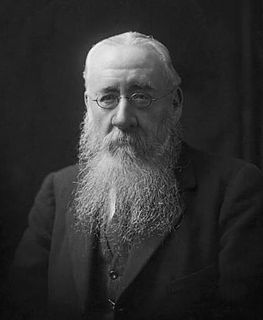A Quote by John Shelby Spong
The Bible was written between 3,000 and 2,000 years ago, and it's filled with the knowledge that people had in that period of time, some of which you and I rejected long ago. The Bible says that women are property, that homosexuals ought to be put to death, that anybody who worships a false God ought to be executed, that a child that talks back to his parents ought to be stoned at the gates of the city. Those ideas are absurd.
Related Quotes
Every one ought to study the Bible with two ends in view: his own growth in knowledge and grace, and passing it on to others. We ought to have four ears,- two for ourselves, and two for other people. My Bible is worth a good deal to me because I have so many passages marked that, if I am called upon to speak at any time, I am ready. We ought to be prepared to pass around heavenly thoughts and truths, just as we do the coin of the realm.
A few years ago, they [Neandertals] were thought to be ancestral to anatomically modern humans, but now we know that modern humans appeared at least 100,000 years ago, much before the disappearance of the Neandertals. Moreover, in caves in the Middle East, fossils of modern humans have been found dated 120,000-100,000 years ago, as well as Neandertals dated at 60,000 and 70,000 years ago, followed again by modern humans dated at 40,000 years ago. It is unclear whether the two forms repeatedly replaced one another by migration from other regions, or whether they coexisted in some areas
Today there survives more than 25,0000 partial and complete, ancient handwritten manuscript copies of the New Testament. These hand written manuscripts have allowed scholars and textual critics to go back and verify that the Bible we have in our possession today is the same Bible that the early church possessed 2,000 years ago.
I think the Bible is completely inspired by God in its overall messages. But, for the people of those days to know what was going to happen 4,000 years later in a world of astronomy or subatomic particles. They didn't have access to the knowledge that we presently have about geology. So, we know now that the world was created many of billions of years ago, 13 or 14 billion years ago. As far as they knew, the earth was the center of the universe. They thought that stars were little twinkling things in the sky where as now we know stars are very distant and much larger than the earth.
Perhaps the most remarkable thing I found about the Bible was how flexible it is. Here we have a book written 3,000 years ago, with bizarre stories, peculiar laws, erratic deity, and yet we are able - through argument, selective reading, and desire - to find a powerful framework of laws and moral reasoning that have built a very successful society. So this Bible, for all its oddities and flaws, serves us beautifully after all these years.
A few years ago the Deists denied the inspiration of the Bible on account of its cruelty. At the same time they worshiped what they were pleased to call the God of Nature. Now we are convinced that Nature is as cruel as the Bible; so that, if the God of Nature did not write the Bible, this God at least has caused earthquakes and pestilence and famine, and this God has allowed millions of his children to destroy one another. So that now we have arrived at the question - not as to whether the Bible is inspired and not as to whether Jehovah is the real God, but whether there is a God or not.
Living in the now is freedom from all problems connected with time. You ought to remember that sentence, you ought to memorize it, and ought to take it out, you ought to practice it, you ought to apply it. And most of all, you ought to rejoice in it because you have just heard how not to be wretched, miserable you any more but to be a brand new, and forever brand new man or woman.
Today we take it for granted that the Bible is in our language. We forget that the Bible used to not be available to the common man. It's no wonder that TIME magazine recorded the number one event of the last 1,000 years was the Gutenberg printing of the Bible which made this book available in mass form to all people.
Numbered among our population are some 12,000,000 colored people. Under our Constitution their rights are just as sacred as those of any other citizen. It is both a public and a private duty to protect those rights. The Congress ought to exercise all its powers of prevention and punishment against the hideous crime of lynching, of which the negroes are by no means the sole sufferers, but for which they furnish a majority of the victims.
Once in his life, a man ought to concentrate his mind upon the remembered earth, I believe. He ought to give himself up to a particular landscape in his experience, to look at it from as many angles as he can, to wonder about it, to dwell upon it. He ought to imagine that he touches it with his hands at every season and listens to the sounds that are made upon it. He ought to imagine the creatures there and all the faintest motions of the wind. He ought to recollect the glare of noon and all the colors of the dawn and dusk.






































